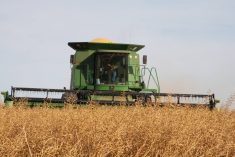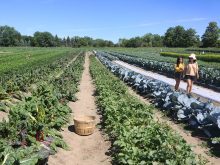Pivot Spirits, which grows its own ingredients, won two golds for gin and another for liqueur as well as three silver medals
It’s one thing to open and operate a distillery but another to grow the grains needed to produce the whisky, gin and vodka on top of that.
But Lars Hirsch is reaping the benefits of what he sowed in 2018 by winning a bevy of awards at the Artisan Distillers Canada awards.
Hirsch’s Pivot Spirits in Rolling Hills, Alta., took gold in two categories of gin and another for liqueur while adding three silver medals to its collection in one category of vodka and two for young whisky.
Read Also

Canada told trade crisis solutions in its hands
Canadians and Canadian exporters need to accept that the old rules of trade are over, and open access to the U.S. market may also be over, says the chief financial correspondent for CTV News.
“I’ve been growing the soft wheat, rye, barley, triticale and spelt,” said Hirsch, adding he uses sugar beets from the area for his rum and local honey for his liqueur. “One of the reasons I started this is we grow the best grains in the world right here in the Prairies and I wanted to add a special twist to that with the irrigated grains here and I’m making good progress getting this area recognized for the special terroir (characteristic flavour) it can produce in the spirits.”
Hirsch said he hopes for good things once his whiskies mature later this year.
“In Canada, you have to age whisky for three years before you call it whisky and this summer, my whiskies will be coming of age,” he said.
Hirsch said he is especially proud of the recent awards as they come from an organization committed to craft distilling.
“This is the organization that means the most to me because it’s other true craft people in the country. In this short time, I’ve exceeded what I thought I could accomplish with the quality of my spirits,” he said. “And I’m excited to see what I can do in the future.”
But the business is challenging, he added.
“For craft producers — especially the spirits, a little more than beer — it’s hard to get the word out and there are a lot of people who would like to support local producers, but they aren’t that aware of it,” said Hirsch. “If I can get people to sample my spirits, they recognize the quality and they start to follow us and start to look for our products.”
With craft spirits coming with additional costs, that also poses a challenge.
“We have a unique situation in Alberta in that smaller manufactures can get a provincial tax break if they distribute themselves… so we’re not able to go through the AGLC (Alberta Gaming, Liquor and Cannabis) logistics program and ship to the warehouse in St. Albert.”
Hirsch said the Alberta Craft Distillers Association is making progress in dealing with that issue “because none of us sign on to become logistics companies.”
Inter-provincial trade barriers can also pose a challenge but Hirsch said it’s one he welcomes despite Alberta allowing craft spirits from other provinces.
“Just because that type of competition is good for smaller manufactures to produce Canadian products that are good quality,” he said. “It’s almost easier to export to the U.S. than other provinces in Canada.”
However, with a restaurant as part of his distillery and good weather, Hirsch said he’s hoping to continue to draw patrons from across the province to his establishment.
“I really enjoy it and the whole experience and the story of what we are doing,” he said.


















